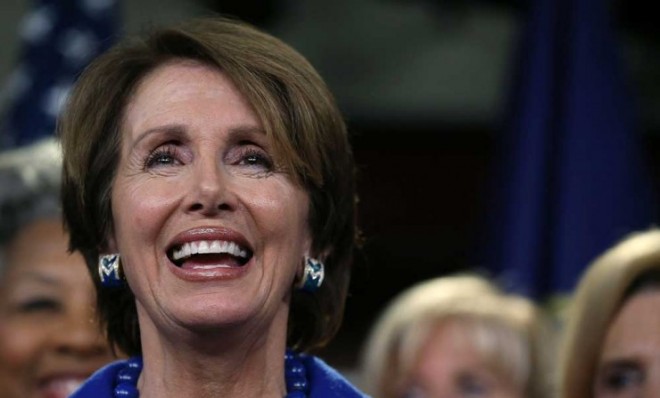Why Democrats think they can retake the House in 2014
They don't think voters will scratch their six-year itch


Two-term presidents historically suffer from voters' six-year itch, when the president’s party loses a substantial number of House and Senate seats after a half dozen years in office.
But Democrats think it might be different in 2014.
National Journal obtained a confidential memo from Democratic Congressional Campaign Committee Chairman Steve Israel (D-N.Y.) which argues that his party is in a much stronger political position to start the 2014 campaign than in either of the last two cycles.
The Week
Escape your echo chamber. Get the facts behind the news, plus analysis from multiple perspectives.

Sign up for The Week's Free Newsletters
From our morning news briefing to a weekly Good News Newsletter, get the best of The Week delivered directly to your inbox.
From our morning news briefing to a weekly Good News Newsletter, get the best of The Week delivered directly to your inbox.
Israel directly rebuts the conventional wisdom that House Republicans have a near-lock on their majority at least until the next redistricting of congressional seats in 10 years.
Writes Israel: "Redistricting has empowered the worst elements of the Republican Party, amplifying the extremist echo chamber and making the tea party Republican congress toxic to voters. Republicans redrew already-safe members into even more Republican districts, driving control of their party more to their base, forcing more primaries, and making it less likely that they can put forward a party agenda that appeals to Independents."
Democrats, who won a net eight seats last year, need to win 17 more to retake control of the House. It’s a tough goal but, they are energized with new promises from President Obama to raise money, campaign vigorously, and even help recruit candidates.
Last year, Obama focused exclusively on his re-election campaign. But now, his former campaign operation — rechristened as Organizing for Action — has pledged to bring its grassroots forces to winning more seats for Democrats in the midterm elections.
A free daily email with the biggest news stories of the day – and the best features from TheWeek.com
Whether Israel is spinning a best-case scenario to buck up his House colleagues remains to be seen. But a deeply unpopular Republicans Party facing an energized Democratic Party and a president intent on sealing his legacy will certainly make it an exciting midterm election campaign.
Taegan D. Goddard is the founder of Political Wire, one of the earliest and most influential political websites. He also runs Wonk Wire and the Political Dictionary. Goddard spent more than a decade as managing director and COO of a prominent investment firm in New York City. Previously, he was a policy adviser to a U.S. senator and governor. Goddard is also co-author of You Won — Now What? (Scribner, 1998), a political management book hailed by prominent journalists and politicians from both parties. Goddard's essays on politics and public policy have appeared in dozens of newspapers across the country, including The Washington Post, USA Today, Boston Globe, San Francisco Chronicle, Chicago Tribune, Philadelphia Inquirer, and Christian Science Monitor. Goddard earned degrees from Vassar College and Harvard University. He lives in New York with his wife and three sons.
-
 Political cartoons for December 14
Political cartoons for December 14Cartoons Sunday's political cartoons include a new White House flag, Venezuela negotiations, and more
-
 Heavenly spectacle in the wilds of Canada
Heavenly spectacle in the wilds of CanadaThe Week Recommends ‘Mind-bending’ outpost for spotting animals – and the northern lights
-
 Facial recognition: a revolution in policing
Facial recognition: a revolution in policingTalking Point All 43 police forces in England and Wales are set to be granted access, with those against calling for increasing safeguards on the technology
-
 Has Zohran Mamdani shown the Democrats how to win again?
Has Zohran Mamdani shown the Democrats how to win again?Today’s Big Question New York City mayoral election touted as victory for left-wing populists but moderate centrist wins elsewhere present more complex path for Democratic Party
-
 Millions turn out for anti-Trump ‘No Kings’ rallies
Millions turn out for anti-Trump ‘No Kings’ ralliesSpeed Read An estimated 7 million people participated, 2 million more than at the first ‘No Kings’ protest in June
-
 Ghislaine Maxwell: angling for a Trump pardon
Ghislaine Maxwell: angling for a Trump pardonTalking Point Convicted sex trafficker's testimony could shed new light on president's links to Jeffrey Epstein
-
 The last words and final moments of 40 presidents
The last words and final moments of 40 presidentsThe Explainer Some are eloquent quotes worthy of the holders of the highest office in the nation, and others... aren't
-
 The JFK files: the truth at last?
The JFK files: the truth at last?In The Spotlight More than 64,000 previously classified documents relating the 1963 assassination of John F. Kennedy have been released by the Trump administration
-
 'Seriously, not literally': how should the world take Donald Trump?
'Seriously, not literally': how should the world take Donald Trump?Today's big question White House rhetoric and reality look likely to become increasingly blurred
-
 Will Trump's 'madman' strategy pay off?
Will Trump's 'madman' strategy pay off?Today's Big Question Incoming US president likes to seem unpredictable but, this time round, world leaders could be wise to his playbook
-
 Democrats vs. Republicans: who are US billionaires backing?
Democrats vs. Republicans: who are US billionaires backing?The Explainer Younger tech titans join 'boys' club throwing money and support' behind President Trump, while older plutocrats quietly rebuke new administration
